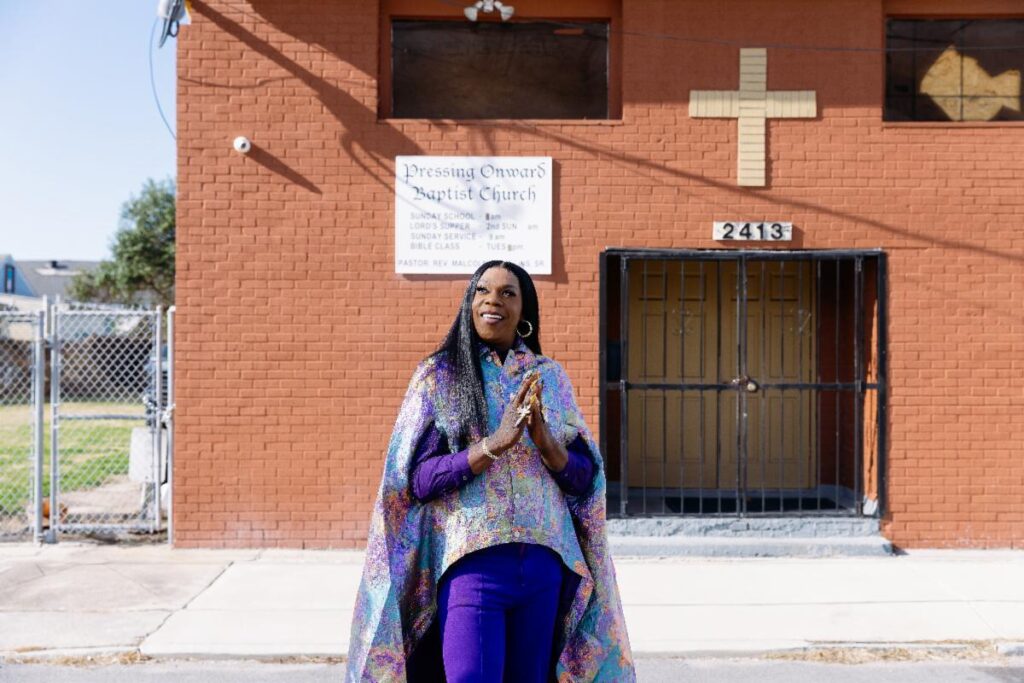
There’s a reason why Big Freedia has been a headliner on the Pride festival circuit for years. The gender fluid rapper made her name by inviting all kinds of bodies to shake it to the bass-heavy bounce bangers that she brought straight out of New Orleans clubs.
Her shows are famously egalitarian dance parties.
But when Freedia returns to Nashville Pride this weekend, she’ll add in an element that may seem antithetical to booty-shaking: her version of sanctified gospel music. She even wrote and recorded some of it here with producer Tony Esterly and singer-songwriter Parson James.
James and Freedia first met when they each performed at a Pride festival in Iowa in 2019, and kept in touch afterwards. “And then this idea of a gospel record came around,” said James, “and she had thought of me.”
James had a reputation for making music haunted by gospel imagery. “Mama, I sinned again,” he sang in his “Sinner Like You” song in 2016. “I went to bed with another man.”
Then he depicted how the news that he was gay rocked his small town, South Carolina congregation: “Altar’s shaking / walls are caving / Hold your blessings / I’m confessing.”
His songs reflected the alienation he’d come to feel toward his religious upbringing. “I was a child of church,” he related. “I was there Wednesday, Saturday, Sunday. I was also in the choir. My relationship with the church had changed, obviously, because being an openly queer man and just how small-minded the churches that I went to growing up had become, it made me reshape how I felt about all of that.”
Freedia wrote about leading her own church choir in her memoir. Her New Orleans congregation was part of the same Black Baptist denomination as the one James attended in South Carolina, and James says they compared their experiences: “When I talked about it with Freedia, she pretty much said that her experience was a lot of joy and she felt welcomed and accepted in the church that she was in. I didn’t feel that way.”
Being asked to work with Freedia on music that preaches a gospel message was well outside of James’ comfort zone. He recalls telling a friend, “This is scary, but I think I’m gonna just do it solely because Big Freedia is so iconic and incredible. There’ll be no way that her intention is not gonna be pure, and it’s gonna be safe for me.”
“At the same time,” James adds, “I was excited to just explore with her, because it was gonna take me back into a place that I’m very familiar with, but have been distant from for a while.”
Freedia signaled how close she still feels to the congregation of her youth by naming her forthcoming gospel album Pressing Onward after it.
James began to get back in touch with his gospel chops, tentatively at first. This happened during James and Freedia’s first session with another collaborator in L.A. and their subsequent meet-ups with Esterly and others in Nashville.
James would feel an idea coming and sing it to Freedia.
“She’s like, ‘Sing it! Sing it louder! Go ahead now.’”
Freedia wasn’t content with lyrics that vaguely nodded to spirituality. Sometimes she’d lean into the type of traditional gospel language James had escaped years back.“Message-wise,” he recalls, “she was like, ‘Be direct. We’re talking about Jesus Christ, we’re talkin’ about God, our Lord and Savior here.”
James had to, as he put it, “get to a place where I was okay with even using words like ‘Jesus.’ ”
What set Freedia’s vision of gospel apart from what James had known?
He begins quoting the lyrics of her new song “Take My Hand: “Tell the congregation / this is Freedia nation … Calling all my Divas / and my non-believers / Even all my Kingas, Straights and the Swingers.”
“So that means that everybody is welcome,” James explains. “That means this is Freedia’s house. Everybody’s coming in.”
She’s extending an explicit and unconditional welcome to those who’ve received condemnation from church.
Freedia and James ensured that “Take My Hand” would bring everyone the spirit-filled ecstasy of a charismatic service.
“If you grew up in a Black Baptist church, they say you can’t leave until the spirit leaves. So we were like, ‘Well, then we need to just keep the song going.’ ”
For an additional audio story from Big Freedia’s Nashville Pride performance, listen below:
Esterly sampled old-time, Southern singing preacher Dr. C.J. Johnson, and chopped up Johnson’s pleading lines so that Freedia’s song has the feel of explosive praise breaks and the groove kicks into double time, just like a church rhythm section would when the preacher really gets cooking.
The refrain keeps going, the voices of Johnson’s long-ago congregation buoyed by James’ new vocal contributions. “We were like, ‘Let’s just keep it going,'” says James. “It should just feel like you have been so tired and you’re finally leaving, you’re fanning your face and you walking out the church doors, finally.”
When Freedia headlines Nashville Pride on Sunday, she’ll do the bounce faves she’s known for. But she’ll also mix in some of that new gospel material — and that may come as a surprise to those attending the festival celebrating the LGBTQ community.
James says he wishes he could be there to see it: “My hope is that people can receive it and see how unique it is for an artist like Big Freedia to be doing something like this, and then find some pieces of themselves in all of it.”

